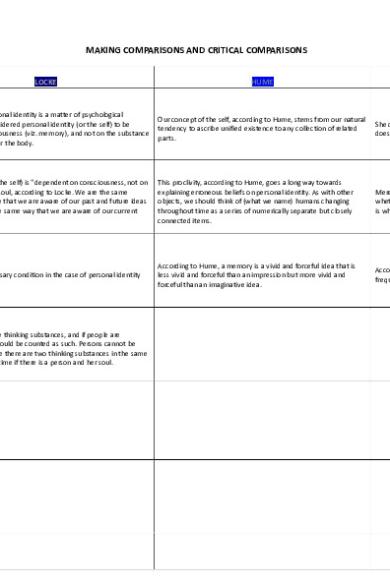Making Comparisons AND Critical Comparisons PDF

| Title | Making Comparisons AND Critical Comparisons |
|---|---|
| Author | Jess Dixon |
| Course | Philosophy, Art, Film |
| Institution | Deakin University |
| Pages | 2 |
| File Size | 145.5 KB |
| File Type | |
| Total Downloads | 28 |
| Total Views | 148 |
Summary
notes...
Description
MAKING COMPARISONS AND CRITICAL COMPARISONS
LOCKE
HUME
What is the nature of the self?
He holds that personal identity is a matter of psychological continuity. He considered personal identity (or the self) to be founded on consciousness (viz. memory), and not on the substance of either the soul or the body.
Our concept of the self, according to Hume, stems from our natural tendency to ascribe unified existence to any collection of related parts.
She does not completely dismiss Locke's memory theory, but she does add that memories are created by people, not by brains.
What signifies identity in persons over time?
Personal identity (the self) is "dependent on consciousness, not on substance" or the soul, according to Locke. We are the same person in the sense that we are aware of our past and future ideas and activities in the same way that we are aware of our current ideas and acts.
This proclivity, according to Hume, goes a long way towards explaining erroneous beliefs on personal identity. As with other objects, we should think of (what we name) humans changing throughout time as a series of numerically separate but closely connected items.
Meredith Michaels argues that we have physical continuity whether we lose memory or not. We still have our bodies and that is what is identifiable even after death.
What is the significance of memory?
Memory is a necessary condition in the case of personal identity
According to Hume, a memory is a vivid and forceful idea that is less vivid and forceful than an impression but more vivid and forceful than an imaginative idea.
According to Michaels, memory is a sufficient condition, but it is frequently regarded as an unreliable source of information.
What is the significance of the soul?
For Locke, souls are thinking substances, and if people are substances, they would be counted as such. Persons cannot be substances because there are two thinking substances in the same place at the same time if there is a person and her soul.
What is the significance of the body?
What are the implications of this theory for moral responsibility?
Key arguments
MICHAELS...
Similar Free PDFs
Popular Institutions
- Tinajero National High School - Annex
- Politeknik Caltex Riau
- Yokohama City University
- SGT University
- University of Al-Qadisiyah
- Divine Word College of Vigan
- Techniek College Rotterdam
- Universidade de Santiago
- Universiti Teknologi MARA Cawangan Johor Kampus Pasir Gudang
- Poltekkes Kemenkes Yogyakarta
- Baguio City National High School
- Colegio san marcos
- preparatoria uno
- Centro de Bachillerato Tecnológico Industrial y de Servicios No. 107
- Dalian Maritime University
- Quang Trung Secondary School
- Colegio Tecnológico en Informática
- Corporación Regional de Educación Superior
- Grupo CEDVA
- Dar Al Uloom University
- Centro de Estudios Preuniversitarios de la Universidad Nacional de Ingeniería
- 上智大学
- Aakash International School, Nuna Majara
- San Felipe Neri Catholic School
- Kang Chiao International School - New Taipei City
- Misamis Occidental National High School
- Institución Educativa Escuela Normal Juan Ladrilleros
- Kolehiyo ng Pantukan
- Batanes State College
- Instituto Continental
- Sekolah Menengah Kejuruan Kesehatan Kaltara (Tarakan)
- Colegio de La Inmaculada Concepcion - Cebu
